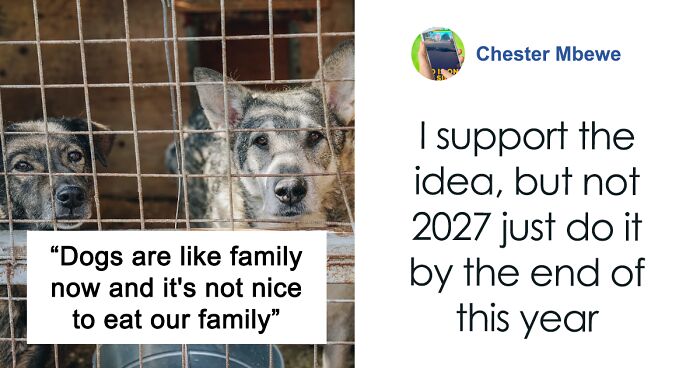
South Korea Bans Dog Meat Trade, Sparking Debate Between Older And Younger Generations
South Korea has banned dog meat production by 2027 following a vote on Tuesday (January 9), eliciting mixed reactions ranging from animal rights support to cultural concerns and debates on hygiene and international comparisons.
The National Assembly passed the bill by a 208-0 vote in a move hailed as “history in the making” by activists, the DailyMail reported.
Dog meat has fallen out of favor with diners over the past few decades in the East Asian nation, with the younger generation especially looking down upon it.
South Korea has banned dog meat production by 2027
Image credits: Sasha Sashina
Outlawing dog meat production means that raising or slaughtering dogs for consumption will be banned, as will distributing or selling dog meat. Moreover, those found guilty of doing so could be sent to jail, the BBC reported.
Subsequently, those found guilty of butchering dogs could reportedly face up to three years in prison or be fined 30 million won (£18,000), while those who raise dogs for meat or sell dog meat could serve a maximum of two years. Nevertheless, the consumption of dog meat itself will not be illegal.
As per the British broadcaster, the new legislation will come into effect in three years, giving farmers and restaurant owners time to find alternative sources of employment and income.
Those concerned have been ordered to submit a plan to phase out their businesses to their local authorities.
Dog meat has fallen out of favor with diners over the past few decades in the East Asian nation
Image credits: Freepik
The government has reportedly assured to give full support to dog meat farmers, butchers, and restaurant owners, whose businesses will be forced to close. Though the details of what compensation will be offered have yet to be worked through, the BBC reported.
According to South Korean statistics, the country counted around 1,600 dog meat restaurants and 1,150 dog farms in 2023. Dog meat stew, called “boshintang,” has been considered a delicacy among some older South Koreans; however, the controversial dish completely lost its popularity amongst the South Korean youth.
As a matter of fact, dogs have been more recognized as pets to humans, with South Korea’s current president, Yoon Suk Yeol, and his wife known to be animal lovers and owning six dogs.
According to a Gallup poll last year, only 8% of people said they had tried dog meat in the past 12 months, down from 27% in 2015. Less than a fifth of those polled said they supported the consumption of the meat, the BBC stated.
“I am overjoyed that South Korea can now close this miserable chapter in our history and embrace a dog-friendly future,” a South Korean activist said
Image credits: Chris Jung/NurPhoto/Getty Images
The British broadcaster felt the discontent amidst the ban at lunchtime in Seoul, down an alleyway with several dog meat restaurants, interviewing a handful of older people who were tucking into the stew.
86-year-old Kim Seon-ho was reportedly disappointed by the ban, as he told BBC: “We’ve eaten this since the Middle Ages. Why stop us from eating our traditional food?” he said. “If you ban dog meat, then you should ban beef.”
On the contrary, 22-year-old student Lee Chae-yeon said the ban was necessary to promote animal rights. “More people have pets today,” she said. “Dogs are like family now, and it’s not nice to eat our family.”
Jung Ah Chae, the executive director of the Humane Society in Korea, said she was surprised to see the ban in her lifetime.
She admitted: “While my heart breaks for all the millions of dogs for whom this change has come too late, I am overjoyed that South Korea can now close this miserable chapter in our history and embrace a dog-friendly future.”
You can watch South Koreans’ divided opinions on the dog meat trade below:
Dog meat farmers had reportedly campaigned against the ban, arguing that, given the declining popularity among young people, the practice should be allowed to die out naturally over time.
One dog farmer, Joo Yeong-bong, told the BBC: “In 10 years, the industry would have disappeared. We’re in our 60s and 70s, and now we have no choice but to lose our livelihoods,” he said, adding that this was “an infringement of people’s freedom to eat what they like.”
One dog meat restaurant owner in her 60s, Mrs Kim, told the BBC: “Young people these days don’t get married, so they think of pets as family, but food is food. We should accept dog meat but raise and slaughter them in a hygienic environment.”
Mrs Kim added: “Other countries like China and Vietnam eat dogs, so why are we banning it?”
Consuming dog meat is legal in mainland China except for the city of Shenzhen. In 2020, the commercial slaughter and sale of dogs was banned in all of China. Nevertheless, the infamous Yulin dog meat festival still takes place annually.
According to Humane Society International (HSI), thousands of dogs and cats are brutally slaughtered for human consumption in Yulin for the summer solstice.
However, the slaughters represent just a fraction of the year-round trade across China. Most of these animals are stolen pets and strays grabbed from the streets, the HSI states.
Some readers demanded the ban happen faster
Over the years, the Yulin authorities have reportedly attempted several crackdowns on the trade, including roadblocks to stop trucks packed full of live dogs and cats from entering the city.
In 2020, the two major cities of Shenzhen and Zhuhai implemented bans on the consumption of dog and cat meat, and China’s Ministry of Agriculture and Rural Affairs made an official statement that dogs are companion animals and not “livestock” for eating.
Despite this progress, the authorities in Yulin have reportedly not implemented robust measures to ban the trade, even though the supply of dogs and cats relies primarily on criminal activity.
As for Vietnam, five million dogs are slaughtered for the trade in the Southeast Asian country every year. That’s 13,699 dogs being killed horrifically every day, Animal Asia states.
Nevertheless, the Global animal welfare organization Four Paws and the Hoi An People’s Committee closed one of the Vietnamese’s last remaining dog meat restaurants, Four Paws reported in December 2023.
As per the organization, the closure marked a milestone since in 2021, when Four Paws signed a two-year Memorandum of Understanding with the Hoi An People’s Committee, agreeing to support them in phasing out the dog and cat meat trade to become a “tourist-friendly” city.
“Dogs are the most helpful pets,” a reader highlighted
1k+views
Share on FacebookExplore more of these tags
I can't comment on what other cultures eat (however - dog lover here). But I was stationed at Camp Humphreys in Pyeongtaek back in the 1990s, and we could hear a dog farm (lots of barking) from the night range; the sad thing was when they would club a dog to death (supposedly the adrenaline from fear made them taste better?), you could hear the screams of pain, and then total silence. None of the dogs would bark for about 20 minutes. One of the saddest sounds I can remember hearing.
Whaaaaaat. Okay... see, that... no. C'mon. Don't freakin' ... geezus. Okay, you can't tell me that they don't know a way to do a not-torture-to-death kill. I mean... Killing is brutal in and of itself.. but... like... we don't tend to condone, like... The Farmer running around with a steel baseball bat to bludgeon the chickens/cows/pigs to death.
Load More Replies...In every piece of film shot at the dog “farms”, they are an incredible number of obviously pure breed dogs in the cages. That tells me they were someone’s pet that got stolen and caged to be eaten. Please do not look up how they’re slaughtered. It’s incredibly disturbing, especially when so many are stolen pets that are missing their homes and parents. TBH, all animals should be treated humanely and with respect. Those we eat should be free range while alive and humanely, well, slaughtered (terrible word). It should be done as quickly as possible, to try to eliminate suffering—-until we have better alternatives that can satisfy that taste for meat, when we can stop raising animals to eat. Now, I’m not talking about milk and eggs, though dairy cows and chickens should still be freed from the factory farms, and be living free range lives. The eggs are not fertilized, the milk is not an animal, and the collection of neither one requires the animal to be killed, which is why I don’t include them.
I can't comment on what other cultures eat (however - dog lover here). But I was stationed at Camp Humphreys in Pyeongtaek back in the 1990s, and we could hear a dog farm (lots of barking) from the night range; the sad thing was when they would club a dog to death (supposedly the adrenaline from fear made them taste better?), you could hear the screams of pain, and then total silence. None of the dogs would bark for about 20 minutes. One of the saddest sounds I can remember hearing.
Whaaaaaat. Okay... see, that... no. C'mon. Don't freakin' ... geezus. Okay, you can't tell me that they don't know a way to do a not-torture-to-death kill. I mean... Killing is brutal in and of itself.. but... like... we don't tend to condone, like... The Farmer running around with a steel baseball bat to bludgeon the chickens/cows/pigs to death.
Load More Replies...In every piece of film shot at the dog “farms”, they are an incredible number of obviously pure breed dogs in the cages. That tells me they were someone’s pet that got stolen and caged to be eaten. Please do not look up how they’re slaughtered. It’s incredibly disturbing, especially when so many are stolen pets that are missing their homes and parents. TBH, all animals should be treated humanely and with respect. Those we eat should be free range while alive and humanely, well, slaughtered (terrible word). It should be done as quickly as possible, to try to eliminate suffering—-until we have better alternatives that can satisfy that taste for meat, when we can stop raising animals to eat. Now, I’m not talking about milk and eggs, though dairy cows and chickens should still be freed from the factory farms, and be living free range lives. The eggs are not fertilized, the milk is not an animal, and the collection of neither one requires the animal to be killed, which is why I don’t include them.

 Dark Mode
Dark Mode 

 No fees, cancel anytime
No fees, cancel anytime 


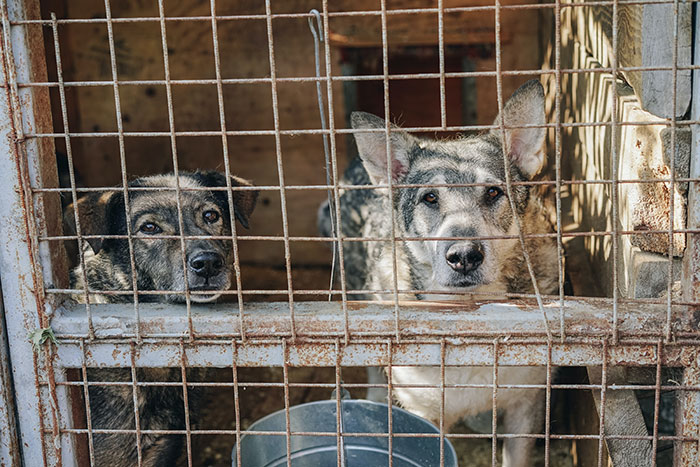
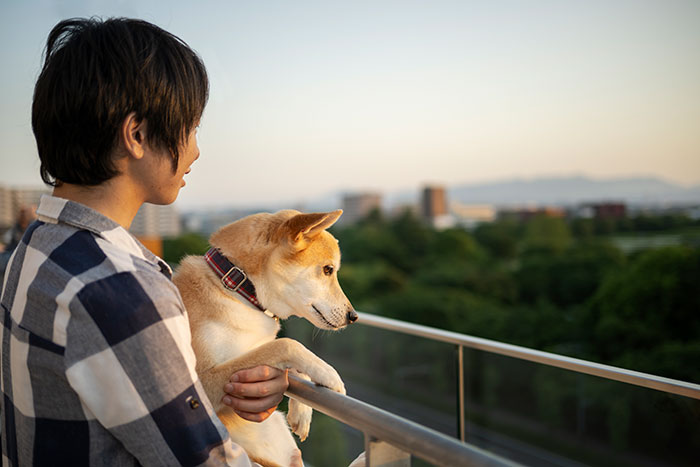
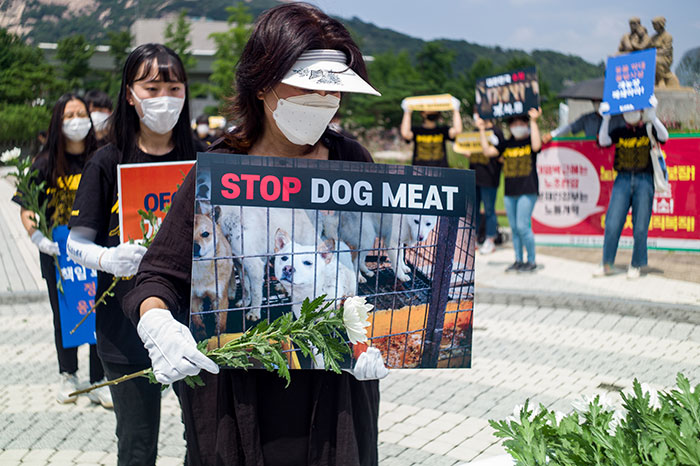




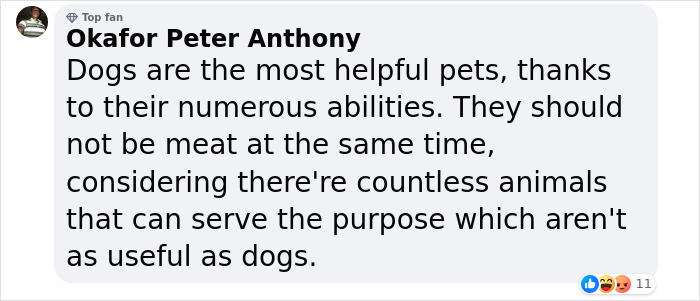
















































77
18